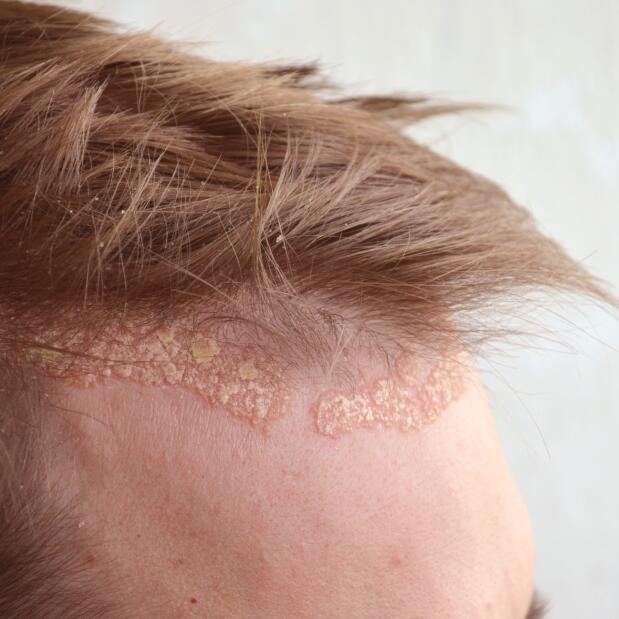Psoriasis of the scalp
Psoriasis of the scalp
You’ve noticed red patches and small flakes dead skin on the edges of your face and hair. Sometimes they itch. What if it's because of scalp psoriasis? Here are some tips on how to recognise, prevent and relieve it.

Recognising scalp psoriasis
The scalp is one of the most common sites of psoriasis, affecting half of all psoriasis sufferers. This chronic skin condition can be recognised by its red patches with white dead skin (scales) on top. Psoriasis is caused by an excessively rapid a turnover of skin cells and develops in flare-ups.
Scalp psoriasis can be located at the top of the forehead, behind the ears and the back of the neck, or even cover the whole head like a helmet. Scalp psoriasis causes real discomfort, often associated with itching, and the scaling of the patches produces large, dry, white flakes. Because of its location, the psychological impact is usually significant.
FRIENDLY (AND EXPERT) ADVICE
"For more than two years, I have noticed patches on my scalp a few centimeters in diameter with crusts that fall off like dandruff. Is it psoriasis?"
Preventing and treating scalp psoriasis
The diagnosis of scalp psoriasis should be made by a doctor or dermatologist. They will prescribe suitable treatments in the form of a gel, lotion, foam, cream or shampoo, depending on the precise location. Outside of flare-ups, if your scalp psoriasis is more prevalent on the forehead, behind the ears and on the back of the neck, consider moisturising. The daily application of an emollient is highly recommended to prevent skin dryness, which is common among psoriasis sufferers. To do this, choose an emollient that is fluid enough to facilitate its application. It must be adapted for this use and respect the indicated instructions for use... (e.g. apply the emollient with your fingertips to the scalp in small circular motions, leave it on for 3 hours or overnight, then remove it with a mild shampoo). This will limit the formation of scales and itching, which can be intense in the case of scalp psoriasis. Scratching the patches can cause secondary infections and lead to a Koebner phenomenon that increases your psoriasis.

Scalp psoriasis questions
Because of its location, scalp psoriasis raises certain questions.
Does it cause hair loss?
No, scalp psoriasis itself does not cause hair loss. However, if left untreated, it can slow down hair growth because the hair is trapped in the scales. Scratching also makes it more fragile and brittle.
Can I dye my hair?
You can, under certain conditions. For example, dyeing is not recommended during a flare-up or on irritated or recently scratched skin. In any case, choose dyes with natural active ingredients rather than chemical dyes, which are potentially irritating.
Living with eczema and psoriasis
FRIENDLY (AND EXPERT) ADVICE
Scalp psoriasis: some tips to avoid scratching.
If you have "helmet" scalp psoriasis, make sure you choose a very mild shampoo, as any irritation can trigger a flare-up, and therefore itching. Brushes and drying should also be as gentle as possible.
On the skin, washing should be careful and you should moisturise daily. A cleansing oil and emollient will, for example, help to "soften" the scales, and limit itching and scratching.
Combined with the treatments prescribed by your doctor or dermatologist, these precautions will help you improve your scalp psoriasis.
Best practices for scalp psoriasis
Daily moisturising is the foundation of the scalp psoriasis care routine. To wash the face and hair and moisturise sensitive areas, choose products specially formulated for dry skin and itching, and apply them gently with your fingertips. The skin and hair should also be dried as gently as possible.
Our solutions for scalp psoriasis
Eau Thermale Avène products designed to soothe scalp psoriasis.
- Thermal Spring Water Spray
Thermal Spring Water
Thermal Spring Water SpraySoothes - Restores the skin barrier - Calms
Which skin care routine should you adopt?
Identify what it really needs with the help of our experts and discover the most suitable skin care routine for you.

